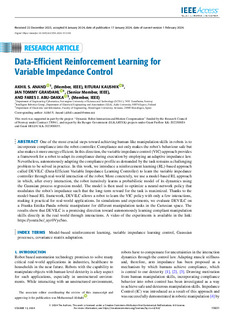Izenburua
Data-efficient reinforcement learning for variable impedance controlEgilea
Beste instituzio
Aalto University (Finland)Norwegian University of Science and Technology (NTNU)
Bertsioa
Bertsio argitaratua
Eskubideak
© 2024 The AuthorsSarbidea
Sarbide irekiaArgitaratzailearen bertsioa
https://doi.org/10.1109/ACCESS.2024.3355311Non argitaratua
IEEE Access Vol 12Argitaratzailea
IEEEGako-hitzak
Model-based reinforcement learningvariable impedance learning control
Gaussian processes
covariance matrix adaptation
Laburpena
One of the most crucial steps toward achieving human-like manipulation skills in robots is to incorporate compliance into the robot controller. Compliance not only makes the robot’s behaviour safe but ... [+]
One of the most crucial steps toward achieving human-like manipulation skills in robots is to incorporate compliance into the robot controller. Compliance not only makes the robot’s behaviour safe but also makes it more energy efficient. In this direction, the variable impedance control (VIC) approach provides a framework for a robot to adapt its compliance during execution by employing an adaptive impedance law. Nevertheless, autonomously adapting the compliance profile as demanded by the task remains a challenging problem to be solved in practice. In this work, we introduce a reinforcement learning (RL)-based approach called DEVILC (Data-Efficient Variable Impedance Learning Controller) to learn the variable impedance controller through real-world interaction of the robot. More concretely, we use a model-based RL approach in which, after every interaction, the robot iteratively learns a probabilistic model of its dynamics using the Gaussian process regression model. The model is then used to optimize a neural-network policy that modulates the robot’s impedance such that the long-term reward for the task is maximized. Thanks to the model-based RL framework, DEVILC allows a robot to learn the VIC policy with only a few interactions, making it practical for real-world applications. In simulations and experiments, we evaluate DEVILC on a Franka Emika Panda robotic manipulator for different manipulation tasks in the Cartesian space. The results show that DEVILC is a promising direction toward autonomously learning compliant manipulation skills directly in the real world through interactions. A video of the experiments is available in the link: https://youtu.be/_uyr0Vye5no . [-]
Finantzatzailea
The Research Council of NorwayGobierno Vasco
Gobierno Vasco
Programa
IKTPLUS-ICT and digital innovationElkartek 2022
Elkartek 2023
Zenbakia
270941KK-2022-00024
KK-2023-00055
Laguntzaren URIa
Sin informaciónSin información
Sin información
Proiektua
Dynamic Robot Interaction and Motion CompensationProducción Fluída y Resiliente para la Industria inteligente (PROFLOW)
Tecnologías de Inteligencia Artificial para la percepción visual y háptica y la planificación y control de tareas de manipulación (HELDU)
Bildumak
Item honek honako baimen-fitxategi hauek dauzka asoziatuta:






















